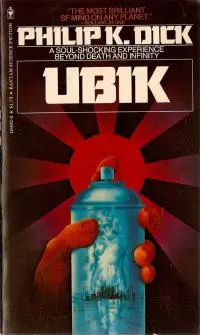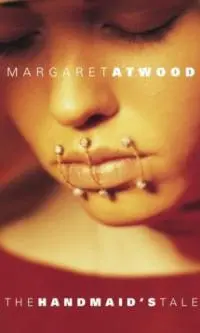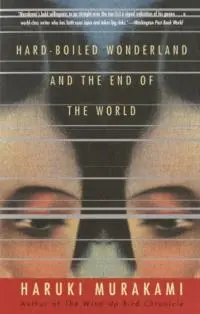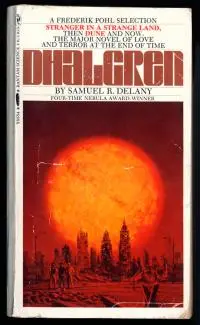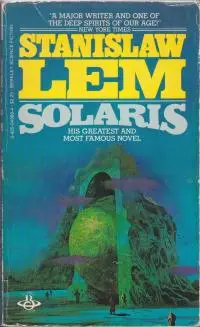By now we all acknowledge that science fiction isn’t pulpy wish-fulfillment for nerds and literary novels aren’t pretentious bore-fests for academics.
Well, I mean, they are that, sometimes. But they can also be so much more.
And despite screams of protest from fans of both genres, these paper-bound proton packs cross streams more often than you'd think, with varying results.
The idea that science fiction can explore profound ideas, or that literary works can include fantastical technology, still manages to horrify plenty of people. If your stodgy old middle school English teacher knew that you quote Darth Vader more than Holden Caulfield, she’d have that aneurysm all over again. Some people just don’t want ray guns in their post-modernist malaise, and vice versa.
The truth is that science fiction and more academically acceptable literature have been having secret make-out sessions in the broom closet since long before your English professor was reading Nabokov at Vietnam War protest rallies. (That’s something proto-professors were doing back then, right?)
So let’s explore some of the most literary science fiction novels.
But before we start, let’s define what we mean by “literary.” (Uh oh, I can hear the pitchforks coming out already.) We’re talking about “serious” books that are more concerned with having something to say than telling a story. These novels prefer intellectual ideas and the human condition to simple entertainment, although they aren’t mutually exclusive. (Hey! I hear you snickering. Stop it.) This list will definitely contain those sci-fi novels that carry on the literary tradition of being completely obtuse, overly metaphorical, and obscenely multi-layered to the point that no one knows what’s going on.
Let’s also get a few of the most obvious books out of the way, the ones that have been on so many required reading lists that no one really thinks of them as science fiction anymore. For instance, there are a nice string of Cold War-era dystopias that you’ve claimed to have read for a grade sometime during your education: 1984 by George Orwell, Brave New World by Aldous Huxley, Fahrenheit 451 by Ray Bradbury. Then you have some of the classics from back when science fiction wasn’t really a thing, yet: Frankenstein by Mary Shelley, The Time Machine by H.G. Wells, just about any Jules Verne book, and maybe even Mark Twain’s A Connecticut Yankee in King Arthur’s Court, which all display some varying levels of literary-ness. (I just heard more snickering, but it might have been the ghost of Samuel Clemens this time.)
You may have varying opinions about which books deserve to be on this list. And we’re hoping you have some hilarious English class anecdotes regarding views of science fiction. Either way, sound off in the comments. Now, on to the most literary of science fiction novels.
![]() 'Ubik' by Philip K. Dick
'Ubik' by Philip K. Dick
I knew you were expecting a Philip K. Dick novel on this list. I could almost feel the vibrations of all your mouse wheels frantically scrolling down to look for Do Android’s Dream of Electric Sheep. Hopefully I have vindicated and disappointed you all at the same time.
All of old PKD’s novels have that literary quality that can most succinctly be summarized with the word, “Gwuh?”, but they also deal with some deep ideas. Ubik is impossible to summarize in a sentence or two because it’s nuts, but it still feels relevant. Also, you never really figure out what’s real and what’s not. Classic literary move there, Mr. Dick.
'The Road' by Cormac McCarthy
This is for McCarthy fans and the people who like to point out to them that they just read a science fiction novel. If McCarthy’s sentence structure isn’t speculative enough for you, look at the post-apocalyptic wasteland setting. Some pretty serious science fiction tropes there, whether you like it or not.
'The Left Hand of Darkness' by Ursula K. LeGuin
It’s hard to decide whether this or The Dispossessed belongs on the list more. Fortunately, they both take place in the same universe, and they’re equally thought-provoking. LeGuin is widely known in the science fiction community as a very literary writer, so she’s a solid lock for this list. The Left Hand of Darkness appears in particular because it’s (roughly) epistolary and deals with themes of gender, religion, and communication.
![]() 'The Handmaid’s Tale' by Margaret Atwood
'The Handmaid’s Tale' by Margaret Atwood
Margaret Atwood might be a little upset to find herself on this list because she has been very vocal about not considering herself a science fiction writer. Sorry, Margaret, The Handmaid’s Tale is sci-fi. It won the Arthur C. Clarke award for best science fiction novel in 1987, for Asimov’s sake. It’s also a pretty harrowing dystopian tale about female subjugation. If feminist themes don’t qualify it as literary, I don’t know what will.
'The Giver' by Lois Lowry
Remember that time in grade school when your teacher told you to read a “kid’s book” with a black cover and a melancholy bearded man on the front? Remember a few weeks later when you finished it and wanted to yell at your teacher for introducing you to something that doesn’t have a happy, conclusive, Saturday-morning-cartoons-style ending? That was this book. The Giver has been terrorizing and (hopefully) expanding little minds for 20 years now. Also, it’s more evidence to support the idea that literary authors love dystopias.
'Slaughterhouse-Five' by Kurt Vonnegut
It’s Kurt Vonnegut, and it involves alien abduction and time travel. That’s all I need to say. It also supports the theory that when literary writers don’t go with dystopia, they lean toward time travel.
'The Time Traveler’s Wife' by Audrey Niffenegger
See what I meant about time travel? This book is unique in that it has been classified as both science fiction and romance. It either won or was nominated for plenty of awards in and out of the science fiction community.
![]() 'Kindred' by Octavia Butler
'Kindred' by Octavia Butler
Continuing the time travel theme, this book follows a young black woman as she is transported back through time to a slave plantation in the old South. Butler is well recognized for the quality and depth of her science fiction writing, and she even received a MacArthur Foundation Genius Grant.
'Hard-Boiled Wonderland' by Haruki Murakami
This is another great “Gwuh?” novel. Every other chapter, the narrative switches between science fiction and fantasy, and is tied together in some crazy fashion inside the protagonist’s mind. There are human computers, unicorn skulls that deliver dreams, and… well, you’ve just got to read it.
'The Glass Bead Game' by Hermann Hesse
Not only is it a fantastic bit of futurist prose about the limits of technology and intellect, it also won the Nobel Prize for Literature in 1946. It has all the hallmarks of good literature (heck, it’s often called a bildungsroman, which is German for “My hipster boyfriend demanded that I read this”) and an absurd future quiz game.
![]() 'Dhalgren' by Samuel R. Delaney
'Dhalgren' by Samuel R. Delaney
This one is a doozy. It’s crazy, complex, full of mystery and metaphor, and definitely science fiction. In the grand tradition of literary novels, this one has left many a reader scratching their head or tossing the thing at a wall in frustration.
'The Self Reference Engine' by Toh EnJoe
Speaking of challenging literature, this one is completely impenetrable. It’s a series of short stories that combine to form a larger narrative, but they also intertwine and play off one another. Not only is it a slog, it’s pretty mind-bending, too, with plenty of scientific principles twisted into it. If you enjoy deep ideas (that often require a technical, mathematical, or scientific background to fully understand) this book is fun, but you still may find yourself getting lost within the chapters.
'Never Let me Go' by Kazuo Ishiguro
This book was shortlisted for the Man Booker Prize and the Arthur C. Clarke Award, which safely covers both the literary and science fiction ends of the spectrum. It also seems to be many things to many people, as various critics have place it in the horror, thriller, and coming of age genres.
'Shikasta' by Doris Lessing
I was going to argue this is literary science fiction based on the fact that the author is a Nobel-prize winner, and the story is basically a history textbook as interpreted by an alien race. But I think author Damien Walter’s summary does it better: Shikasta “unit[es] the infinities of the far future and intergalactic space with the psychological depths of human mythology and spirituality whilst laying a feminist critique of the entire history of human civilization. And it has some of the absolute trippiest, mind warping imagery of any SF novel ever written.” That seems sufficient.
![]() 'Solaris' by Stanislaw Lem
'Solaris' by Stanislaw Lem
Lem is known for injecting philosophy into his works, and Solaris is no exception. The book follows a research team studying a planet that may actually be a sentient organism studying them in return. Cue ominous music.
'Zone One' by Colson Whitehead
We’ll argue about whether zombies are science fiction or strictly horror later. For now, this is a science fiction novel by a widely recognized literary author. Turns out he’s pretty good at mixing genres.
'Super Sad True Love Story' by Gary Shteyngart
Even though Apparats sound an awful lot like regular smartphones, and the GlobalTeens network is basically an even worse version of Facebook (sounds impossible, I know), this story takes place in a dystopian version of New York. As advertised, it tells a love story that’s interesting and deals with some themes that might sound familiar, such as materialism, government oversight, and dependence on media.
This is just the beginning of literary science fiction. Check out other novels by these authors because most of them don’t disappoint. Just don’t read PKD while on drugs. The nightmares are bad enough while sober.
Tell us in the comments which books should or shouldn’t be on the list, or alternatively, go on a rant about what the true definition of “literary” is, you literary crusader, you.

About the author
Daniel Hope is a writer, ukelele player, and unrepentant nerd. He has worked as a technology journalist (too frantic), a PR writer (too smarmy), and a marketing writer (too fake). He is currently the Managing Editor of Fiction Vortex, an online publication for science fiction and fantasy short stories. At FV, he's known as the Voice of Reason. That means FV staff members wish he would stop worrying all the time. He thinks they should stop smiling so much.
Daniel Hope lives in California and dreams of writing more. When distraught about his output, he consoles himself with great beaches and gorgeous weather. He recently published his science fiction novel, The Inevitable, on the Kindle Store and Smashwords. Find out more at his site: SpeculativeIntent.com.
